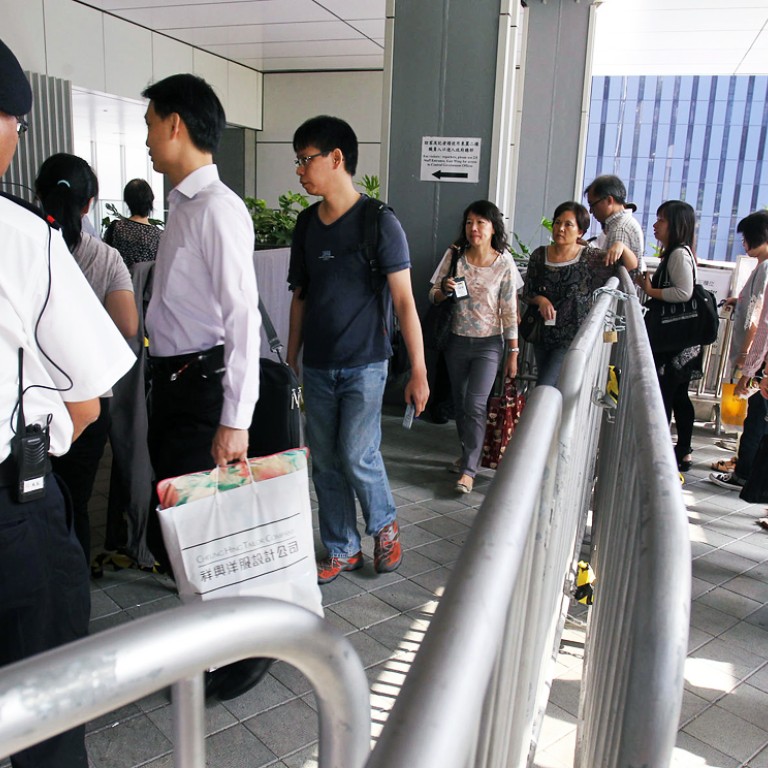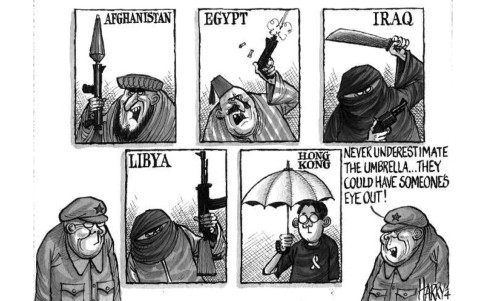
Agreement on talks with students near as Occupy Central protests dwindle
Students and government officials hope to start dialogue this week, after civil servants return to work in Admiralty and schools reopen
Students and government officials have reached a consensus to start a dialogue on political reform as soon as this week as the city edged towards some sort of normality eight days after Occupy Central protests began.
But the students also reiterated that they would not end their protests in Admiralty, Causeway Bay and Mong Kok unless a substantive breakthrough was made.
Speaking after an hour-long meeting last night, the Federation of Students' deputy leader, Lester Shum, said he had agreed with Lau Kong-wah, undersecretary for constitutional and mainland affairs, that there would be multiple rounds of talks and they would be based on an equal relationship and mutual respect.
"We agreed that the meeting should [start] this week," Shum said. "We want it to be a substantive dialogue, not just a casual chat or a consultative session."
Agreement has yet to be reached on the venue for the federations' meeting with Chief Secretary Carrie Lam Cheng Yuet-ngor and other top officials, with the students wanting it to be held at a university, preferably the University of Hong Kong.
Briefing the press separately, Lau said the national legislature's framework for the 2017 chief executive poll - which sparked the protests in the first place - should be followed if Hong Kong wanted to reform its electoral system in a legal manner.
But Shum later suggested that Lau's insistence on the framework might be an "obstacle" that would make a constructive dialogue difficult.
The demonstrations were triggered by Beijing's decision to restrict the city's electoral reform. Thousands more joined in when police used tear gas on the crowds in Admiralty on September 29.
Tensions eased considerably yesterday after protesters agreed to allow access to the government headquarters in Admiralty. Thousands of civil servants returned to work. Some protesters handed flowers and soup to civil servants in a show of goodwill.
"I hope both sides show more mutual understanding towards each other," said Teresa Poon, a middle-aged housewife who prepared the hot soup.
All 51 primary schools in the Wan Chai and Central and Western districts will reopen today - another sign that the city is gradually recovering from the impact of the unprecedented civil disobedience movement. Secondary schools there reopened yesterday.
Chief Executive Leung Chun-ying again called for an end to the protests. "We are sincere in having dialogue on constitutional development," he said in a videotaped address.
The protests have caught worldwide attention. While most Western governments sympathised with the movement, they also believed it would not sway Beijing.
Charles Powell, who served as private secretary to then British prime minister Margaret Thatcher when the UK negotiated Hong Kong's return to China during the 1980s, told the BBC he did not believe the protests would make a difference.
"The position about elections has been clear since the [Basic Law] was published in 1991 and I don't believe for one moment that [Beijing is] going to change that basic position," Powell said.
The size of the protests in Admiralty, Mong Kok and Causeway Bay dropped noticeably as exhaustion set in and people returned to work.
Lee Kwok-chung, senior traffic police superintendent, said around 2.9km of roads in the city were still occupied by protesters, down from 5km last week at the peak of the movement.
While the protest sites are still barricaded off, in Causeway Bay only a few dozen stragglers were manning them during the day.
Order also seemed to have returned to Mong Kok after days of sometimes violent confrontations between protesters and people opposing their action.
Director of Administration Kitty Choi Kit-yu said no further action would be taken to clear entrances to the government headquarters blocked by protesters and negotiations would continue with those who were still there.
Leung - whose resignation is being demanded by the protesters - stressed that police would be even-handed in dealing with protesters and people who come out to oppose them.
Commenting specifically on Mong Kok, Leung said police would be impartial in enforcing the law against anyone who resorts to violence, regardless of their political views.
The impact on the economy also eased. The benchmark Hang Seng Index rose 1.09 per cent, or 250.48 points, to finish at 23,315.04 yesterday. Hong Kong Exchanges and Clearing chief Charles Li Xiaojia said he was glad to see calm returning to the streets. "Protesters have achieved their goal and made their voices heard," he said.


